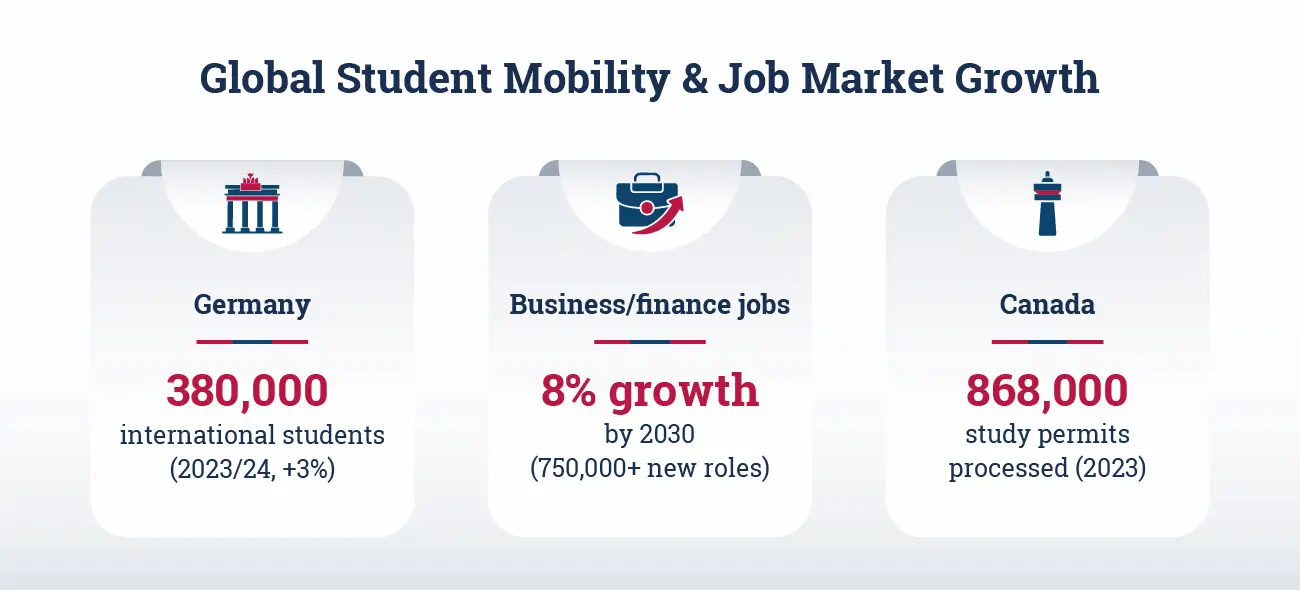International business education is a game-changer in today’s global economy, where businesses thrive on cross-border connections. It is not only about learning the basics of business; it is also about mastering the art of navigating diverse markets, cultures, and regulations.
It is the difference between staying local and thinking globally, between guessing and knowing how the business world really works. Think of a small startup in Tampa competing with giants in Tokyo or Paris. This is the reality of today’s business world, and it demands professionals who can think globally.
With this education, you will acquire the knowledge and skills to handle international trade, manage multicultural teams, and capitalize on global opportunities. From understanding currency fluctuations to embracing emotional intelligence, discover why international business education matters, the business skills it builds, and how it fuels economic growth.
Understanding International Business Education
International business education blends business, economics, and world perspectives to prepare students for the global business arena. This program shapes leaders who can navigate global markets, manage international trade, and adapt to rapid change.
In a globalized world, businesses operate across borders, needing leaders who understand diverse markets and legal systems. With global business studies, students gain knowledge and skills that employers want, from emotional intelligence to strategic thinking and real-world business skills.
This education teaches you how to analyze global markets, lead international teams, and strategize amidst geopolitical shifts. The importance of international business education is clear: it prepares students for the demands of international business in today’s economy, enabling them to experience the benefits of studying international business on a global scale.
What Specific Do You Need to Know About International Business Education?
- Global economic trends and education drives the demand for adaptable professionals.
- Preparing students for international business careers means blending business program theory with hands-on practice.
- The impact of globalization on business education leads to dynamic, future-focused curricula.
- Skills learned in international business programs include cultural agility, digital literacy, and leadership.
- International business education and economic growth work hand-in-hand, fueling innovation.
Important Facts about International Business Education
| Statistics | Fact |
| Global student mobility | Germany hosted 380,000 international students in 2023/24, up 3% from previous years. |
| Post-graduation work options | Germany allows 20 work hours/week for international students. |
| MBA salary outcomes | Top MBA graduates earn $240K+. |
| Job market growth | A growth of 8% in business/finance jobs by 2030; 750,000+ new roles. |
| Competitive differentiation | A 148-point gap between top/bottom MBA programs. |
| Application volumes | Canada processed 868,000 study permits in 2023. |
Importance of International Business Education in Today’s Economy
The importance of international business education shines in today’s economy, where globalization drives business growth. Many companies, from startups to multinationals, engage in global markets. Recent studies show a significant demand for professionals skilled in cross-border operations.
Rapid changes—think technology advancements or trade policy shifts—require adaptability. International business education equips you with the tools to manage risks such as currency fluctuations or regulatory changes.
It also fosters global business studies that prepare you for high-demand careers.
Why Do Companies Need International Business Graduates?
They bring fresh perspectives on global business challenges.
Their skills boost company resilience and innovation.
They help firms expand into new markets and adapt to change.
Benefits of Studying International Business
- Expanded career opportunities in multinational firms, NGOs, and startups.
- Higher earning potential (MBA grads average $240K+).
- Access to global networks and mentors.
- Real-world problem-solving experience.
- Skills that translate across industries and borders.
Impact of Globalization on Business Education

The impact of globalization on business education is profound. Companies now operate on a global scale, needing professionals who understand international business in today’s economy.
International business education teaches you to handle trade complexities, manage diverse teams, and stay ahead of global economic trends and education. The future of international business education will focus on sustainability, ethical leadership, and the ability to work with imperfect data in dynamic settings.
Curious about emerging trends? Check out The Future of International Business.
Other Emerging Trends Are:
- Artificial intelligence (AI) and automation in business analysis.
- Sustainability as a core business value.
- Cross-border collaboration and innovation.
Essential Skills for Global Leaders
Studying international business in a globalized world builds critical business skills. You gain:
- Cross-Cultural Competency: Working seamlessly with diverse teams.
- Strategic Adaptability: Crafting strategies for varied global markets.
- Ethical Leadership: Making decisions with emotional intelligence.
- Data-Driven Decisions: Using analytics to navigate the business world.
- Supply Chain Expertise: Managing global business logistics.
These skills learned in international business programs make you a standout candidate.
Learn more about supply chain strategies at Supply Chain in International Business.
Preparing Students for International Business Careers
Preparing students for international business careers means more than classroom learning. It involves hands-on projects, internships, and exposure to real-world business situations. The benefits of studying international business programs include access to diverse roles.
Graduates move into positions such as business analysts, policy advisors, or global marketing managers. Their ability to solve complex problems and lead teams across cultures makes them highly sought after.
Salaries typically range between $80,000 to $125,000, with top positions exceeding $240,000.
Explore career paths with exploring International Careers.
What Makes a Great International Business Program?
- Challenge-based learning
- Global perspective through diverse campuses
- Direct access to international professionals
- Dual degrees provide broader opportunities
Driving Economic Progress

International business education and economic growth are linked inextricably. Graduates drive international trade and investment, creating jobs and sparking innovation. This fuels economic activity worldwide, from local startups to multinational giants.
By promoting ethical practices, international business education also aligns profitability with sustainability.
Discover more about global opportunities at Unlocking Boundless Opportunities.
How Traditional and International Business Programs Differ?
| Aspect | Traditional Business Focus | International Business Focus |
| Market Scope | Domestic regulations | Cross-border compliance |
| Risk Analysis | Local competition | Geopolitical shifts, currency risks |
| Cultural Training | Limited | Core curriculum component |
| Network Reach | Regional connections | Alumni from 130+ nations |
Get Real-World Ready with Schiller’s MBA
The MBA in International Business at Schiller International University stands out for its global focus and real-world approach. With campuses in Tampa, Madrid, Paris, and Heidelberg, this business program offers students the chance to study international business on a global scale.
The 15-month, 45-credit program offers practical projects, international networking, and direct access to industry leaders. The curriculum covers international trade, marketing, and supply chain management, emphasizing emotional intelligence and ethical leadership. Earn dual US and European degrees for global recognition.
The Global Employability Path (GEP) offers certifications from Google and AWS, boosting your business skills. Scholarships up to 50% make it accessible to all.
Find out why it is a top choice at Reasons to Study an MBA at Schiller.
Turn Global Complexity into Your Career Advantage
International business education is the key to thriving in today’s global business landscape. It equips you with the knowledge and skills to lead in a globalized world, from managing teams to driving innovation. The benefits of studying international business are clear: high-demand careers, global networks, and economic impact.
Schiller’s MBA in International Business delivers that expertise—through classrooms without borders, industry-aligned projects, and a network spanning continents.
Apply Now to start your 15-month transformation.
FAQs
Q1: What is international business education and why is it important?
Answer: International business education teaches students how to work across borders, understand global markets, and manage diverse teams. Businesses need people who can handle the complexities of international trade, adapt to new cultures, and make smart decisions in a rapidly changing world.
Q2: How does international business education prepare students for the global economy?
Answer: It blends classroom learning with real-world projects, internships, and exposure to different cultures.
Q3: What career opportunities can international business education offer?
Answer: Careers range from business analysts to global marketing managers, supply chain specialists, and policy advisors, each offering the opportunity to work internationally.
Q4: Why do employers value international business graduates?
Answer: These professionals bring new ideas, help companies expand, and manage risks in international operations.
Q5: How does international business education contribute to economic growth?
Answer: It prepares leaders who drive innovation, create jobs, and connect markets worldwide. By training professionals to handle global challenges, international business education supports economic growth and resilience.

 Request information
Request information









